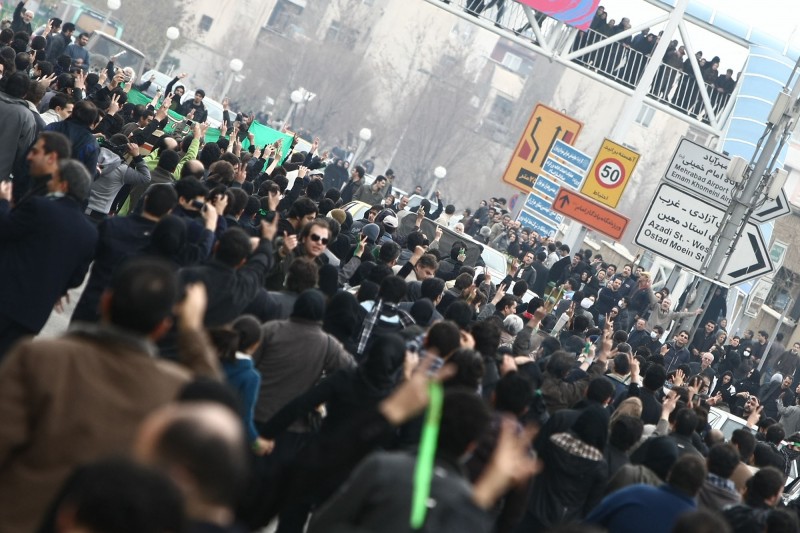 [1]
[1]Anti-government protesters battle in the streets with riot police armed with shields, batons and tear gas in Tehran, Iran, on 27 Dec., 2009. Millions took the streets in the months following the 2009 elections. Photo by A.A. Copyright Demotix
Iran's hardline parliament voted to sack moderate President Hassan Rouhani's Minister of Science, Research and Technology Reza Faraji-Dana during a parliamentary impeachment session in what some have described as the first major political clash between the country's conservatives and reformists since the start of Rouhani's presidency.
A total of 145 members of parliament gave Faraji-Dana a vote of no confidence, while 110 voted in support of him and 15 abstained, illustrating the divide between hardline and moderate members of Iran's 9th sitting parliament.
The head of Iran's Principalist faction, Gholam Ali Haddad-Adel, explained to Fars News Agency [2], “The parliament is cooperating with the Rouhani administration, but MPs are sensitive to issues associated with the sedition.” Sedition refers to the protests associated with the Green Movement against the results of the 2009 presidential elections, which saw conservative Mahmoud Ahmadinejad's reelection. Officials called it a landslide victory, but millions believed the vote was rigged and took to the streets. After months of massive demonstrations, authorities brutally suppressed [3] the movement.
During the parliamentary impeachment session, a number of MPs accused Dana of being an extremist associated with opposition elements in 2009. He was criticized [4] for allowing university students who were expelled because of the protests to return to school, as well as hiring employees not approved by Iran's Ministry of Intelligence.
The hashtag #استیضاح [5], which means impeachment in Persian, has been trending amongst Persian-language tweets as news and commentary of Faraji-Dana's sacking is shared on social media.
Iran's hardline newspapers printed their front page headlines in condemnation of Faraji-Dana's alleged “extremism.” In the tweet below from the account for conservative online website Mashregh News, the front pages of Iran's Vatan Emrooz and Kayhan are featured. Vatan Emrooz is a conservative newspaper with strong ties to both the Iranian Revolutionary Guard and former President Ahmadinejad. Kayhan's management and editorial policies are known to be directly associated with the office of the Supreme Leader Ayatollah Khamenei. Both are well known and widely read newspapers within Iran:
#تیتر [6] #استیضاح [5] تیتر یک کیهان و وطن امروز؛ وطن امروز: “نه” مجلس به افراط کیهان:مجلس شاخ فتنه را شکست @vatan_emrooz [7] pic.twitter.com/ok92igPiVN [8]
— H.Soleimani (@MashreghNews_ir) August 20, 2014 [9]
#Impeachment #headlines. Headlines for Kayhan and Vatan Emrooz; Vatan Emrooz: Parliament says NO to extremism. Kayhan: Parliament defeats the horns of conspiracy.
Many reformists, such as former President Mohamed Khatami, have come to Faraji-Dana's defence, claiming his disassociation from the events of 2009:
شهادت میدهم که #فرجیدانا [10] به هیچ وجه اعمال گرایشهای سیاسی نمیکند. #دانشگاه [11] #استیضاح [5]
— Mohammad Khatami (@khatami_ir) August 19, 2014 [12]
“I can testify that #FarajiDana is in no way involved in acts of political opposition #university #impeachment.”
President Rouhani was absent during the impeachment, attending a provincial tour. In a statement following the vote, Rouhani went on to say, “During Faraji-Dana's management in the Ministry of Science, he put his utmost effort in expanding science and knowledge and creating a relaxed atmosphere within our universities.”
Rouhani named [13] Ali Najafi as the interim head of the ministry. Najafi was initially appointed by Rouhani as the head of Iran's Cultural Heritage, Handcrafts and Tourism Organization, but later resigned from the position and continued to serve in Rouhani's administration. Rouhani noted that he would like Najafi to continue the ministry in the direction Faraji-Dana had been leading it.
The overall sentiment by moderate politicians, especially those associated with Iran's reformist factions, has been to concentrate efforts to elect a more reform-minded parliament during the 2016 parliamentary elections. Former 2013 reformist presidential candidate Mohammad Reza Aref was quoted in the reformist Etemaad newspaper urging [14] Iranian youth and students to correct parliament's decision by ensuring victory in 2016. He stated, “The future parliament is a place for youth. We do not want to challenge the system, but to enter the election through the constitutional framework. The real fight is against those who do not want to participate in the elections.”